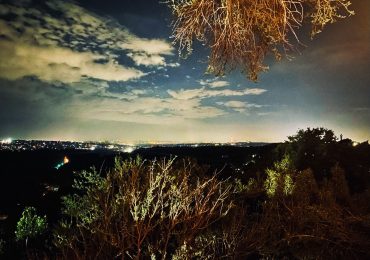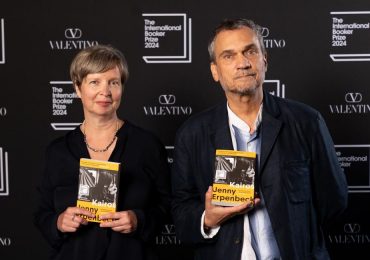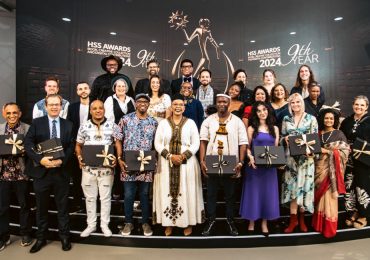Header image: Elvira Espejo Ayca, Zukiswa Wanner and Ian McEwan
Writer, publisher and curator Zukiswa Wanner has been awarded the 2020 Goethe Medal, along with Bolivian artist and museum director Elvira Espejo Ayca and British writer Ian McEwan.
Awarded annually by the Goethe-Institut, the Goethe Medal is the official badge of honour of the Federal Republic of Germany. The medal honours non-Germans for an ‘outstanding commitment to international cultural exchange’. This year, the prize is awarded under the theme ‘accepting contradiction—the fruits of contradiction’.
Born in Zambia, to a South African father and a Zimbabwean mother, Wanner now lives in Nairobi, Kenya, and contributes regularly to The JRB. In 2018 she co-founded an Africa-focused publishing company, Paivapo, and published a travel memoir, Hardly Working. Together with the Goethe-Institut in Nairobi, Kenya, she developed the transnational series Artistic Encounters, and is also the curator of the Afro Young Adult project. Since the coronavirus lockdown she has been curating the virtual literary festival AfrolitSansFrontières, organised by sixteen writers from ten African countries.
The Goethe Medal jury says:
‘Zukiswa Wanner’s conception of herself as an African writer leads her to range far beyond national frontiers in her writing, while at the same time bringing the diversity of African culture into her artistic work.
‘Her detailed knowledge of South African literature and her nuanced understanding of regional discourses and female identity in Africa mean her expertise is internationally sought after; she is also a role model for an entire generation of African writers.’
President of the Goethe-Institut Klaus-Dieter Lehmann says:
‘The theme, “accepting contradiction—the fruits of contradiction” is a plea for engagement with ambivalence, even in difficult circumstances. It is precisely out of contradiction that productive vitality grows, vitality that promotes diversity and provokes reflection and new insights.
‘Faced with the populist movements that are gaining in strength throughout the world, functioning democracy must assert critical discourse.
‘The recipients of the 2020 Goethe Medal are outstanding examples of the power of critical, reflective art and open, international, cultural exchange that does not shun contradiction but rather recognises it as an opportunity.’
The Goethe Medal is traditionally awarded in Weimar, Germany, on Goethe’s birthday, 28 August, with accompanying events held in collaboration with the Kunstfest arts festival. Final details of this year’s programme will be announced in the coming weeks.
Since the first Goethe Medal award in 1955, a total of 354 personalities from sixty-seven countries have been honoured, including Daniel Barenboim, Pierre Bourdieu, David Cornwell alias John le Carré, Sir Ernst Gombrich, Lars Gustafsson, Ágnes Heller, Petros Markaris, Sir Karl Raimund Popper, Jorge Semprún, Robert Wilson, Neil MacGregor, Helen Wolff, Juri Andruchowytsch and Irina Scherbakowa.
Goethe Medal jury citations
Elvira Espejo Ayca, born in 1981 in Bolivia, is the director of the National Museum of Ethnography and Folklore (MUSEF) in La Paz as well as being an artist—a poet, essayist, musician and weaver. The Goethe Medal Committee honours Espejo Ayca as a ‘true builder of bridges, whose work constitutes invaluable cultural mediation: between Latin America and Europe, between Bolivia and its colonial past, between countries’ own indigenous traditions and other cultures, between artistic disciplines and generations. It is in her engagement with ambivalence that she develops her unique creative energy’.
Ian McEwan, born in 1948 in England, is one of the most important and most internationally respected contemporary authors. ‘His literary work is imbued with the essence of contradiction and with critical, deeply psychological reflection on phenomena that affect society as a whole, such as climate change, artificial intelligence and morality in science. Despite the harsh attacks he is often subjected to in his own country, he campaigns against narrow-minded nationalism and is a passionate pro-European.’
Zukiswa Wanner, born in 1976 in Zambia, is a writer, journalist and publisher. ‘Her conception of herself as an African writer leads her to range far beyond national frontiers in her writing, while at the same time bringing the diversity of African culture into her artistic work. Her detailed knowledge of South African literature and her nuanced understanding of regional discourses and female identity in Africa mean her expertise is internationally sought after; she is also a role model for an entire generation of African writers.’
About the award winners 2020
Elvira Espejo Ayca, born in 1981 in the province of Avaroa in the department of Oruro in Bolivia, grew up in an indigenous village community. From an early age, she rebelled against the tradition and convention that excluded her from higher education and precluded her from obtaining a professional qualification. Her decision to pursue her education and career led her to break with her family and her village. In 2004 she studied art at the Academia de Bellas Artes Hernando Siles in La Paz. She has never forgotten her indigenous roots, and weaves them continually through her work and her projects. In 2005 she co-lectured on unwritten Andean languages for the Duke en los Andes programme, working with musician Álvaro Montenegro to record traditional songs and dialogues on indigenous and urban musical instruments. From 2010 to 2011 she was a contributor to the Das Potosí Prinzip exhibition at the Haus der Kulturen der Welt cultural centre in Berlin, which subsequently toured in Spain and Bolivia. She then joined the Board of Directors for the Institute of Aymaran Languages and Culture (ILCA) and became Director of the National Museum of Ethnography and Folklore (MUSEF) in La Paz, turning it into one of the most important cultural centres in Bolivia.
Ian McEwan, born in 1948 in Aldershot in England, was the son of a Scottish army major and grew up among other places in Singapore, Libya and Germany. He studied English Literature at the University of Sussex in Brighton and the University of East Anglia in Norwich. Today, McEwan is a highly renowned contemporary author and has won numerous literary prizes, including the Man Booker Prize, the National Book Critics Circle Award and the Los Angeles Times Book Prize. Eleven of his stories have been turned into films, including Atonement (2007), which was nominated for seven Oscars. Ian McEwan was made a Commander of the Order of the British Empire (CBE) in 2000. In 2011 he was awarded the Jerusalem Prize for the Freedom of the Individual in Society. He has also been the recipient of prestigious awards in the German-speaking world, such as the Alfred Toepfer Foundation Shakespeare Prize for his life’s work (1999) and the German Book Prize (2003). Over twenty of his works have been published in German by Diogenes Verlag.
Zukiswa Wanner was born in 1976 in Lusaka, Zambia and is a writer, journalist, publisher and curator. After attending school in Zimbabwe, she studied journalism at Hawaii Pacific University in Honolulu. Since 2006 she has been an author and a promoter of African literature. In addition to fiction for children and adults, she has published reportage, essays and travelogues, which have appeared in international newspapers and magazines (The Guardian, The Observer, Juice, Elle and many more). She co-authored the Nelson Mandela biography, A Prisoner’s Home (Penguin, 2000). Together with the Goethe-Institut in Nairobi, Kenya, she developed the transnational series Artistic Encounters, which brings African writers into discussion with other artists. She is also curator of the Afro Young Adult project and has established short story writing workshops. The renowned Hay Festival selected Zukiswa Wanner as one of its preeminent African authors in 2014. In 2018 she founded her own publishing house, Paivapo, together with Nomavuso Vokwana. Since the coronavirus lockdown she has been curating the virtual literary festival AfrolitSansFrontières, organised by sixteen writers from ten African countries.





